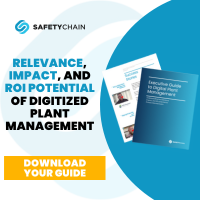Manufacturers Are the New Targets for Cybersecurity Attacks: How Can You Protect Your Plant?
Unlike the previous industrial revolutions that involved replacing existing technologies and assets with modern ones, Industry 4.0 is about mastering the hurdles and opportunities presented by disruptive technologies like big data, machine learning, and AI, which continue to blur the lines between the digital and physical worlds.
Although increased technological adoption drives more intelligent manufacturing through flexible, productive, and agile operations, it’s not without its challenges. As more processes are digitized, the potential cybersecurity threats increasingly affect the manufacturing sector and continue to grow in both intensity and number.
Established corporate entities are not immune to the threats and are perhaps even more attractive targets. For instance, a recent cyberattack on meat supplier JBS led to a complete shutdown, and the company had to pay a ransom of $11 million. This is just one of the many examples of high-profile cybersecurity incidents in manufacturing, and it's clear that a quick response is necessary for manufacturers to secure their proprietary data.
Outdated Software Is Posing the Greatest Threat to Manufacturing
In late May, cybersecurity analysts in the University of Minnesota alerted the Agriculture Department about the threat posed by ransomware. One and a half weeks later, this prediction became real after a ransomware attack led to the closure of the meatpacking giant. This recent hack is the starkest example of the manufacturing industry's vulnerability to cybersecurity threats.
Most manufacturers don't consider themselves primary targets like their counterparts in the health and financial services sector. As a result, most still rely on outdated onsite software to run their operations. However, they're not as invincible as they might imagine, and the widespread reliance on legacy on-premise software systems means they face an even greater risk.
The IT infrastructure needed to maintain on-premises software solutions opens your company up to countless and constantly growing cybersecurity vulnerabilities. Cybercriminals actively seek out vulnerable companies, and if a business’s system has gaps, they’re nearly three times as likely to experience a data breach. Cloud-based software providers can maintain a level of security infrastructure to fend off attacks that are cost-prohibitive for most individual companies. Cloud businesses amortize the costs of security across many customers to bring efficiency for essential services like backup, disaster recovery, network hardening, scalability, software patching, security test, and redundancy
Migrating to cloud-based software could be the answer to all your cybersecurity woes. Otherwise, you face the risk of costly cyber incidents that could halt your operations and lead to other severe implications.
The Potential Impact of Cyber Attacks on Manufacturing Organizations
A cyberattack can be devastating for your entire organization, and the consequences can be long-lasting. Here are just some examples of how a successful cyber incident could derail your business:
Financial losses
Direct financial implications are perhaps the most obvious consequence of cyberattacks. Cybercriminals may enact a fraudulent transfer or require a ransom payment. You'll also have to deal with damage payment and fines. In essence, practically every consequence of a cybersecurity incident comes with a financial loss which could significantly impact your bottom line.
Stolen Intellectual Property
Your company's technologies, product designs, and market strategies are among its most valuable assets. As such, this is among the key targets by threat actors. The full impact of losing your company's proprietary information cannot is beyond measure.
Legal Liabilities
A data breach could lead to a relatively minor operational impact and data breach, but you must consider civil and regulatory liability risks for such incidents. Regulatory obligations might require you to report incidents or suspected breaches with heavy non-compliance fines, and you may also face civil lawsuits.
Loss of Productivity
Like other outages, lost productivity is the main impact of an attack. The incident will first consume staff time directly, and routine IT functions will likely halt. Even after resuming normal operations, teams must clean up the mess, find the root cause, address loopholes, and reinforce security. All these factors can hinder business growth, at the very least.
Damaged Reputation
Besides the immediate impacts, a cyber-incident could lead to long-term reputational damage consequences. The situation can destroy your partners’ and clients’ trust, and they may even seek business elsewhere. Persuading them to return after a tarnished brand image is no easy feat.
Business Continuity Issues
Severe attacks that halt operations and lead to drastic cost and productivity glitches that may threaten business continuity. For organizations that rely entirely or heavily on web applications, one cybersecurity incident can be enough to put a company out of business.
With all these impacts, manufacturing companies have no other option but to protect themselves from cybercriminals’ activities.
How Manufacturers Can Improve Cybersecurity & Protect Themselves
The cybersecurity problems of the digital era can be best addressed using plant management software with a well-designed cybersecurity structure running on the cloud. Your preferred systems should have security controls like secure profiles and data encryption to ward off cunning cybercriminals.
Other essential cybersecurity hygiene practices to keep you ahead of cyber-attacks:
Perform comprehensive staff training.
According to a recent study, human error has facilitated 80% of cyber losses, either through malicious behavior or accidentally. The first step to ensure is to train your entire manufacturing facility on cybersecurity basics. Teach them how to identify, avoid, or address phishing scams, and implement a robust password policy.
Update your software.
Manufacturers can also beef up their network and software security by routinely updating any applications accessed by workers. Software providers release new application versions with security enhancements to proactively address potential entry points for threat actors. As a result, you must always ensure your applications are up to date.
Deploy the appropriate security level.
A worker who accesses the system from the plant floor using a smartphone or tablet and an office admin trying to send an internal memo from the head office via may require different security features. As such, ensure you've deployed the appropriate level of security for each role in your company.
Consider a jump host.
Manufacturing supply chains are highly connected, so you need security points that limit unauthorized access to multiple systems. Undetected sabotage could lead to catastrophic consequences. To avoid unauthorized PLC access, a jump server or jump box can be helpful for adding an extra layer of security.
Use multi-factor authentication.
A strong password isn't sufficient. Multi-factor authentication will provide an additional layer to protect you against threats. Notably, authentication in a dedicated MFA platform is more secure, and the frequent updates will keep you a step ahead of threat actors.
Cybersecurity Benefits of a Cloud-Based Systems
Cloud-based cybersecurity systems are the most powerful lines of defense when it comes to staying ahead of cybercriminals. Here are the key benefits of using these systems:
DDoS protection: Distributed-Denial-Of-Service attacks are common. But a cloud-based security solution can prevent excess traffic aimed at your servers. It will monitor, absorb, and disperse the attack to minimize risk.
Improved data security: Robust cloud security tools have relevant protocols to protect sensitive data from complex breaches, and third parties can't eavesdrop or tamper with it.
Compliance: Cloud security solutions will maintain and manage your infrastructure for compliance with industry regulations and protect your information.
Flexibility: An excellent cloud computing solution offers the required security as you scale. You can avoid server crashes by scaling during high traffic and scale down once it's over to cut costs.
Availability and support: Your software provider will offer continuous support to ensure your facility is well-protected at all times and any concerns or questions you have are addressed promptly.
Final Thoughts
The current manufacturing cybersecurity landscape is growing more complex by the day, and cybercriminals are now using advanced, cunning ways to access plant management systems and steal data. If you haven't been focusing on your cybersecurity needs, now is the time to step up.
A reliable cloud-based platform for plant management is the enterprise solution you need to secure your company and its data, maintain high-quality production, increase productivity, and ensure regulatory compliance. SafetyChain offers just that.
To find out more about how we can safeguard your sensitive data while optimizing production, get in touch today.



